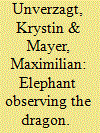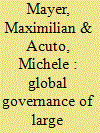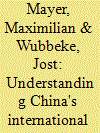|
|
|
Sort Order |
|
|
|
Items / Page
|
|
|
|
|
|
|
| Srl | Item |
| 1 |
ID:
114112


|
|
|
|
|
| Publication |
2012.
|
| Summary/Abstract |
During the last decade, the framing of climate change has been significantly transformed. It has turned from a gradually intensifying, long-term challenge into a highly nonlinear danger that threatens national security. This article explores the reasons, and points to the consequences, of this change. Drawing from actor-network theory, it argues that practices and materials have become entangled across professional and disciplinary contexts. The growing association of chaotic climate change encompasses climatologists, who challenge the mainstream ontology of climate; economists, who started to revisit their economic models; and strategic communities, which began to pick up nonlinear climate changes foregrounding national security. Methodologically, the principle of symmetry that underlies this research aims, as far as is possible, to transcend the dualistic notions of science and politics, and society and nature. The article thereby attempts to open up a debate about the usefulness of a symmetrical approach to enhance research both on global environmental governance in particular, and global politics in general.
|
|
|
|
|
|
|
|
|
|
|
|
|
|
|
|
| 2 |
ID:
163257


|
|
|
|
|
| Summary/Abstract |
Chinese leaders are increasingly mobilizing historical narratives as part of a broader trend that challenges Francis Fukuyama's thesis of the end of history. China's monumental history as an ancient civilization is used to revise the communist party's ideology and to buttress foreign policy ambitions and infrastructural investments—including the ‘belt and road initiative’ and territorial claims in the South China Sea. This more assertive approach to China's immediate neighbourhood resonates with the official reiteration of imperial tropes and concepts of Confucian philosophy, yet assertions that Beijing wants to reanimate the tribute system remain contested. While using historical narratives to legitimize foreign policy is not new, we are witnessing an unprecedented ‘return of history’ as a global social force. By revisiting Fukuyama's claims, I develop the notion of ‘historical statecraft’ and apply it to China's ‘belt and road initiative’. The Chinese case is exemplary for the importance of ideational factors in understanding the recent structural changes often described as the weakening of the West. This article examines in what ways China's historical statecraft is challenging western narratives, what controversies emerge as China articulates its identity as a re-emerging ancient Great Power—one which expects global audiences to acknowledge the value of its cultural norms—and whether the Chinese approach to the use of the past for construing alternative political imaginaries contributes to a peaceful reconstruction of global order.
|
|
|
|
|
|
|
|
|
|
|
|
|
|
|
|
| 3 |
ID:
131266


|
|
|
| 4 |
ID:
141209


|
|
|
|
|
| Summary/Abstract |
The importance of technology in global affairs is visible to the naked and uninitiated eye. Yet International Relations (IR) still lacks a more systematic and critical attention to the role of technological infrastructures in contemporary global governance dynamics. Here, we seek to prompt IR scholars to move ‘large technical systems’ (LTSs) from the contours of IR narratives to a centre stage, as they hold the potential to respond to pressing challenges for IR scholarship. Employing LTSs to respond to recent publications on the challenge that ‘global governance’ poses to IR, we highlight that an STS-IR encounter can, first, revitalise ‘grand questions’ at the heart of IR and, second, help coping with the complexity of global governance. While this encounter does not offer a ready-tailored panacea for the troubles of IR, a more systematic inquiry into LTSs is a powerful step beyond theoretical and methodological impasses, towards greater inter-disciplinary collaboration.
|
|
|
|
|
|
|
|
|
|
|
|
|
|
|
|
| 5 |
ID:
192979


|
|
|
|
|
| Summary/Abstract |
Interpretations and memorialisations of China's long history, in service of political aspirations of the present and towards the future, have long attracted scholarly attention. This special issue addresses how the curation, performance, and consumption of collective memory provide valuable insight into the interplay between the reconstruction of Chinese identity, cultural modernisation, and the shifting role of heritage and memory in Chinese domestic and international politics. Touching on issues around diversity in, for instance, personal/collective memory or community-based/state-led heritage, we consider how state–society relations inform local memory practices. Furthermore, the articles enclosed discuss pertinent and far-reaching impacts of China's cultural-material changes, transformations, and destructions in service of memory re-formation. Investigating the politicisation of heritage and the material solidification of strategically selected representations of the past, we consider how the notion of “memory infrastructure” contributes to an academic understanding of the interaction between history, memory, and politics.
|
|
|
|
|
|
|
|
|
|
|
|
|
|
|
|
| 6 |
ID:
123758


|
|
|
|
|
| Publication |
2013.
|
| Summary/Abstract |
Focusing on the relationship between oil imports and China's compromising and business-like attitude, this article shows that empirical observations do not support several commonplace assumptions that China's growing oil dependence leads to conflict scenarios. The non-escalating nature of the Chinese energy policy constitutes an intriguing puzzle. Although the country currently relies on foreign oil for more than half of its consumption, it does not possess a single overseas base, has not employed troops to secure oil supplies, and strongly relies on world markets to satisfy the growing energy demand. Instead, the main components of the Chinese policy are based on pragmatism fostering integration into existing supply systems and market institutions. This analysis, in turn, points to the importance of structural conditions within global energy politics on the one hand, and pragmatist behaviour on the other, rather than internal motivations or strategic intentions, in order to understand the evolution of China's energy policies. Finally, we briefly discuss the possibility of a reverse dynamic-possibly emerging due to a changing regional or global environment.
|
|
|
|
|
|
|
|
|
|
|
|
|
|
|
|
|
|
|
|
|